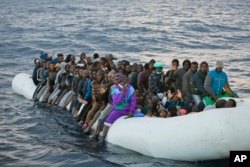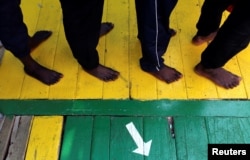Italian officials say their government has told the European Commission in Brussels it is considering stopping ships that are not Italian-registered from disembarking at its ports migrants who were rescued while trying to cross the Mediterranean from Libya.
The dramatic move comes after nearly 11,000 asylum-seekers and economic migrants, mainly from African nations, arrived on Italian shores in a four-day period from war-wracked Libya. In a letter to the commission, Italy's ambassador to the EU, Maurizio Massari, said the situation has become “unsustainable.”
In a meeting Wednesday, Massari informed Dimitris Avramopoulos, the EU’s commissioner for migration, that his government is now considering denying landing rights to any ships that aren’t flying the Italian flag or are not part of the EU interdiction and rescue mission in the Mediterranean.
Libya as migrants' gateway to Europe
Italian Prime Minister Paolo Gentiloni has accused fellow EU nations of “looking the other way,” and not doing enough to assist Italy with the surge in migrants crossing the Mediterranean. Libya has become the main gateway to Europe for migrants and refugees from across sub-Saharan Africa, and also from the Arabian Peninsula, Egypt, Syria and Bangladesh.
Many are fleeing war and persecution, but most who are using Libya are seeking to escape poverty. Italy has become the main point of arrival for all of those rescued off the coast of Libya. Stranded refugees often are picked up by boats operated or funded by private charities and non-government organizations.
An intense debate has erupted in Italy about whether ships operated by mainly international NGOs have effectively been in league with the people-smugglers, and thus inadvertently enabling the trade to continue
Nearly 11,000 arrivals in four days
There has been a dramatic rise, partly thanks to good weather, in the number of migrants attempting the short but perilous Mediterranean crossing. In the four-day period through Tuesday (June 24-27), 8,863 migrants landed in Italy, including more than 5,000 on Monday alone, according to the International Office for Migration. Another 2,000 landed on Tuesday.
In the first five months of this year, 60,228 migrants arrived in Italy by boat. The IOM reported that 1,562 died at sea. At the current rate, and with months of good sailing weather ahead, the number of migrants is on track to exceed the 200,000 who landed in Italy in 2016.
Around 15 percent of those arriving this year are Nigerian. Twelve percent are Bangladeshi; Guineans account for 10 percent and nine percent are Ivorians.
Other EU nations have closed their borders to migrants, hoping to block them from moving north. Poland and Hungary have refused to host some asylum seekers to help ease the burden on Italy and Greece, another front line country. Greece has seen a huge decline in asylum-seeking numbers since the EU concluded a deal with Turkey to curb refugees and migrants using Turkish territory to head to Europe.
The surge in migrants this week prompted Italy’s interior minister, Marco Minniti, to cancel a trip to Washington to address the growing humanitarian crisis, which is quickly morphing into a political one for the country's left-leaning coalition government. In municipal elections this month the coalition lost ground to center-right parties such as Matteo Salvini’s Northern League, which has called for a “stop to the invasion.”
Domestic opposition growing
Italy’s right-wing Forza Italia party has campaigned for the denial of landing rights to ships carrying migrants. And even the maverick radical Five Star Movement is moving to a more anti-immigrant position, calling for a halt to any new migrants being lodged in Rome.
Italy is now asking for the European Commission to change EU asylum procedures and allow Italy to stop new migrant landings or reduce them dramatically. But it is not clear whether a denial of landing rights would comply with international seafaring law or commitments Italy made when it signed the 1951 Refugee Convention.
After meeting Ambassador Massari on Wednesday, EU migration commissioner Avramopoulos praised Italy's exemplary behavior to date and agreed: “Italy is right that the situation is untenable.”
Other EU member states must “step up” and contribute financial support to Italy, Avramopoulos said, along with aid to African nations like Libya to try to reduce the numbers of people leaving for Europe.
“Now is the moment to deliver, and we will hold them to this," the commissioner said.
Avramopoulos made almost exactly the same remarks in February, and similar promises have been made by other EU officials. The bloc's 28 national leaders also agreed last week that "front line" countries Italy and Greece should receive more help with the arrivals.
Last month, the interior ministers of Germany and Italy urged the European Union to set up a border mission along Libya's frontier with Niger in a bid to stop mainly African migrants from reaching Europe. In the past, the EU has tried to curb the migrant flow by working with various authorities in Libya, which is divided between rival governments and their militia backers, but to little avail.
In a sign of the deepening chaos in the north African country, a five-vehicle United Nations convoy was ambushed Wednesday 30 kilometers from the Libyan capital Tripoli. Several U.N. employees were held for a while, then released. Local media reported the ambush was staged in an attempt to gain the release of three drug-runners arrested by a vigilante force in Tripoli.






